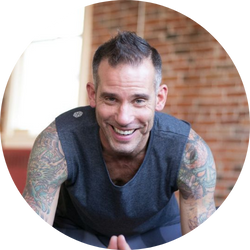Why All The Fuss About Breathing?

How Breathing Affects Our Bodies
There has been a lot of buzz over the last five or ten years in the mainstream around breathing, which, for many people may seem challenging to understand. “I have been breathing my whole life,” or some version of this comment is a common retort I have heard from the back of the audience as I have travelled extensively sharing the importance of understanding this very basic physiological function and how to harness the incredible power that comes with that understanding.
The reality is, that if you are reading this article, you have indeed been breathing your whole life. And, as mentioned above, breathing CAN be a very simple physiological process. One only need observe a newborn baby or an animal to see the simplicity of this vital function. When breathing is going well, it is incredibly simple. Inhale, exhale – that’s it.
The issues arise as we age (and for some of us, these issues may even begin in the womb), as we go through life and experience moments that overwhelm our capacity to process these experiences in the moment, and these overwhelming experiences (which some may call trauma) leave an imprint on our breathing. This is a phenomenon that was observed all the way back in Ancient Greece (and likely before) as combat veterans returned from war. Doctors noticed that even after these veterans returned home and were removed from the incredibly stressful and overwhelming experiences of war, the effects on breathing and overall health remained in the long term.
Stressful experiences may cause us to unconsciously restrict our breathing, hold our breath, breathe erratically or even hyperventilate (breathe in excess of the metabolic demands of the body).
Is that a big deal? The answer is an absolute and resounding YES!!! Breathing you see, affects absolutely every single process that occurs in the body. Most people understand that breathing is related to energy production in the body and that we need oxygen to produce energy (we can also produce energy without energy, but we produce 16x less energy!!).
What may be lesser known is that breathing is also the primary pH balancing mechanism in the body. pH is the measurement of how acid or alkaline a substance is. “Why is that important?” you might ask. Well, it turns out that our body is extremely sensitive to pH. So sensitive it is to pH, that it will do almost anything to regulate pH, because absolutely everything single cell and every process in the body is dependent on the environment of the body maintaining a very narrow range within the pH scale. If the body, and its fluids come out of this narrow band of pH, then that causes the body to function much less than optimally which can cause a myriad of health conditions and effects on other processes in the body.
How Our pH Level Relates to Our Breathing
“So, how does this relate to breathing?” you might be asking yourself. Breathing is the primary way that the body helps to balance the pH and keep it within the narrow little range that the body functions most optimally (there are other mechanisms too, but they are either slower or cause some detriment to the body). Breathing is a continually occurring process that through our inhalation of oxygen rich air which is more alkaline (higher pH) and exhalation of air that is higher in carbon dioxide (low pH) balances the pH of our body with each breath we take. So, when our breathing becomes dysregulated as a result of overwhelming experiences we have had, it becomes easy to see how this affects the rest of the body as a result of its effects on pH.
Breathing is also inextricably intertwined with the functioning of the nervous system. Breathing is one of a couple of different processes in the body that function unconsciously, meaning that we don’t need to think about it, as well as being a process which we can consciously influence (vision is another one). As a result of this ability to consciously influence the breath this opens a door into our nervous system. Normally, our breathing is regulated by a part of the nervous system called the Autonomic Nervous System (ANS). The ANS regulates functions in the body like breathing, heart rate, blood pressure, blood glucose, constriction and dilation of the eyes, as well as many other “automatic” functions of the body, i.e. things that we don’t need to think about.
When our breathing is well regulated, as it is in a person who has experienced very little overwhelm (I don’t know any of those people) or in a person that has consciously brought more awareness to this process, the breath occurs naturally and everything functions well. Everybody is happy (and healthy). Again, the issue arises when our breathing is dysregulated, because the nervous system is actually watching our breathing to know whether it can relax (and be in a state of ease and reparation) or whether it needs to be on high alert to manage potential threats or danger.
When our breathing is faster than it needs to be, we are breathing more than we need to, or our breathing is very erratic, this sends a message to our nervous system that things are not ok. It is a signal to the nervous system to go on high alert because it believes there is a potential threat within our environment (or our body). This creates a whole cascade of different effects within the body from changes to heart rate and blood pressure, blood glucose, hormones, functioning of digestion, blood flow to muscles and organs, and the list goes on and on and on.
Why Breathing Is Integral to Overall Health
As the brain is a part of the nervous system, the above changes also extend to the functioning of our brain and which parts of the brain are active. When we are engaged in dysfunctional breathing, this causes the parts of our brain that make us distinctly human and allow us to make highly creative decisions based on compassion and empathy, as well as our ability to focus, make decisions and communicate effectively to go offline! This means that we begin to function from a highly reactive state in which we are in survival mode and we start to make decisions based on what is good solely for me as opposed to what would benefit the collective, which kind of sums up the state of our world doesn’t it?
Hopefully this has shed some light on some of the most important reasons why breathing is integral to overall health. As author of the award winning book “Breath: The New Science of a Lost Art,” James Nestor would say:
“No matter what we eat, how much we exercise, how resilient our genes are, how skinny or young or wise we are—none of it will matter unless we’re breathing correctly. That’s what these researchers discovered. The missing pillar in health is breath. It all starts there.”
In our future monthly blog posts we will dive into practical tools that will allow us to leverage the breath to improve our health and how we can potentially improve specific conditions simply by harnessing the power of our breath!!

About The Author:
Jeff Sorensen is the founder of breathARMY. His mission is to educate, inspire and empower people to live to their true potential. He offers tools to break through the structures that hold us back from living and expressing that potential in the world. Jeff has studied, mentored and trained with some of the world’s leading experts in breathwork and movement. Wim Hof, Brian Mackenzie, Patrick McKeown, Irene Lyon, Jhenneviev Heartt and David Shannahoff Khalsa are a few of the influences that have led to the creation of breathARMY, a unique offering of breathwork, movement modalities, meditation and exposure to nature and natural stressors that help us to reconnect to our true nature.
Jeff is certified in The Wim Hof Method(Advanced Instructor), Oxygen Advantage(Advanced Instructor), Buteyko Breathing, Nai’a Integrative Breathwork, has studied classical and advanced kundalini pranayama, is a registered 500 hr yoga teacher and a Smart Body Smart Mind Nervous System Apprentice.
Jeff is an international best selling author, paramedic and resides in Kelowna, BC. Jeff is currently the Head of Experience for Entheotech Bioscience and runs the facilitation and integration of EntheoMed Ketamine Suite in Kelowna, BC.
